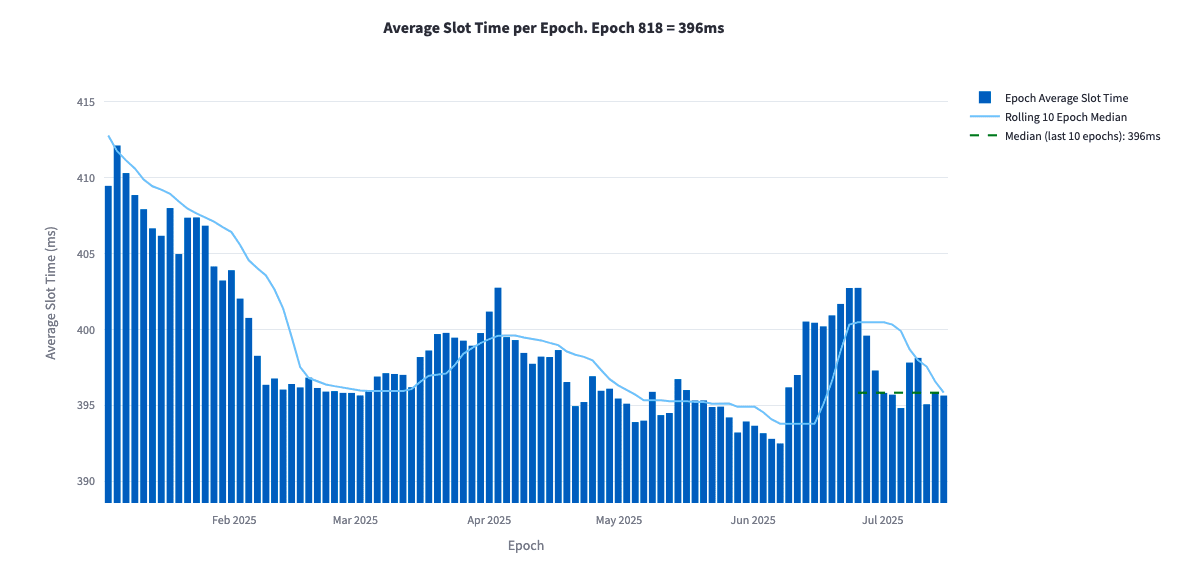Author: Jack Kubinec
Compiled by: Deep Tide TechFlow
As Solana's code issues have gradually been resolved over the past few years, block times (the time required for the network to generate new transaction blocks) have significantly decreased, even falling below its nominal 400 milliseconds.
However, an interesting trend has emerged in the past month: median block times—a key performance indicator for blockchain networks, reflecting the speed at which a blockchain network processes transactions and generates blocks—have surged, causing Solana to slow down the addition of new transactions to the blockchain. The reason lies in a new validator strategy, suggesting that slower block generation may be more profitable. According to Blockworks, Anza, Jito, and Marinade are considering solutions to this issue.

Every Solana block has a validator serving as the leader, responsible for collecting transactions, creating blocks, and broadcasting them to the network. The leader earns transaction fees by creating blocks. More order flow means more fee opportunities, so validators may choose to process transactions in 500 milliseconds instead of 300 milliseconds to increase revenue.
At a fundamental level, some Solana validators seem to be waiting as long as possible to pack more transactions into blocks to maximize their revenue. This behavior has led to an increase in Solana's cycle length.
For a network committed to being as fast as Nasdaq, this is clearly not an ideal situation. Additionally, reduced cycles mean fewer compounding opportunities for staking rewards, as pointed out by Max Kaplan, chief technology officer of Sol Strategies.
Solana provides a mechanism called 'grace ticks,' which is a delay period that allows leaders to successfully submit blocks. This mechanism is designed to prevent unfair penalties for validators in remote locations, but it also opens the door for validators to deliberately delay block submissions.
Additionally, Solana's alternative client Frankendancer recently released a revenue-maximizing scheduler.
According to Kaplan, validators running this client appear to be packaging blocks at a slightly slower than normal speed. However, Kaplan added that Frankendancer's delays are negligible compared to more severe delayers, and he does not see this as a 'bad thing.' Moreover, block delays are not a new concept on proof-of-stake blockchains. However, the upgrades from Firedancer may make this strategy more prominent on Solana. Jump has not commented on this.
Interestingly, Firedancer software engineer Michael McGee described this phenomenon in this week's Lightspeed podcast. He mentioned, 'One thing we see among current validators is that they often create more profitable blocks by delaying transaction execution.'
Blockworks Research analyst Victor Pham pointed out that Solana validators that noticeably delayed blocks typically run modified versions of the Agave-Jito client.
For example, in the 802nd cycle in mid-June, both Galaxy's and Kiln's median block times exceeded 570 milliseconds. According to Solana Compass data, some unmarked validators also run slowly, while Temporal's median block time is 475 milliseconds.
Kiln co-founder Ernest Oppetit admitted that its validator—Solana's sixth-largest staking validator—had delayed block slots for a while but stated it has stopped this behavior.
'At Kiln, we pride ourselves on offering the highest staking annual percentage yield (APY) in the market without compromising security. We have been researching different parts of the tech stack, including timing strategies, and maintaining ongoing discussions with customers, client teams, and the foundation. Currently, we are following the norms and no longer delaying blocks, but many other validators still are. We believe the incentive problem (where fast block generation leads to reduced rewards) ultimately needs to be addressed at the protocol level,' Oppetit stated.
Ben Coverston, engineering director at Temporal, stated when asked about his validators' apparent involvement in the slow block trend: 'I can say that we are not letting people know the reasons for this phenomenon.'
A spokesperson from Galaxy stated: 'As a service provider, we support validator configurations that prioritize maximizing customer staking rewards. On Solana, this may mean proposing slightly slower blocks to ensure higher reward acquisition. Galaxy has also been responsive to community feedback and has adjusted block times to an acceptable range.'
However, the Solana validator community generally believes that slowing down the network is inappropriate, and slow validators are currently facing strong public backlash.
They may soon face more substantial penalties. According to Blockworks, Jito plans to blacklist slow validators from its staking pool, which is the largest in the Solana network.
Brian Smith, chair of the Jito Foundation, stated that the organization is 'drafting a governance proposal to empower a committee to remove underperformers from the JitoSOL delegation pool. This proposal should be open for community discussion in a few days.'
Michael Repetny, co-founder of Marinade, stated that the staking pool provider is 'considering submitting this issue as a governance proposal to discuss the pros and cons of treating [slow validators] as hard rules/violations of delegation strategy.'
Protocol-level solutions are also being advanced. Anza's GitHub repository shows a new proposal suggesting halving the grace ticks period of Solana. Additionally, proposed reforms to Solana's consensus mechanism are also expected to address this issue.
'Alpenglow will solve this problem by enabling the skip voting feature,' said Brennan Watt, vice president of core engineering at Anza.
Watt revealed in a recent episode of the Lightspeed podcast that Anza hopes to launch Alpenglow on the mainnet before the Solana Breakpoint conference in December this year.


